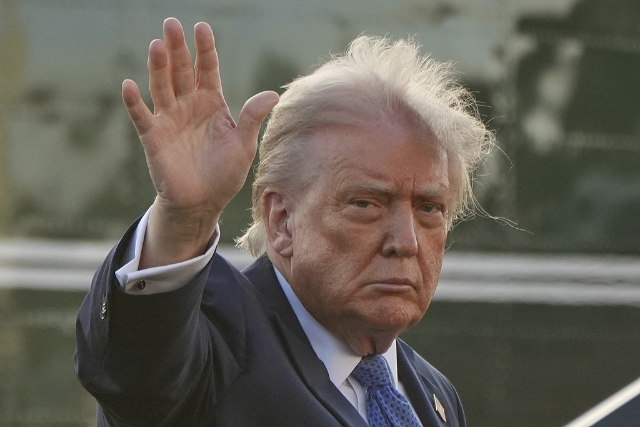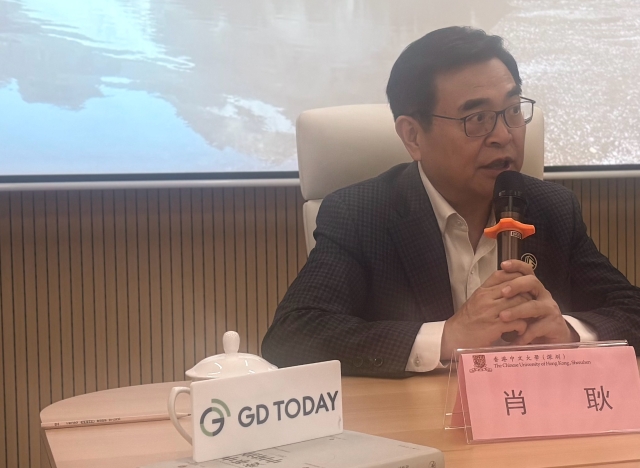In light of escalating tariffs between the US and China, Donald Trump has softened his stance and is now willing to cut tariffs on Chinese goods to de-escalate tensions, as reported by The Wall Street Journal on April 24.

Donald Trump arrived at Leesburg Executive Airport in Leesburg, Virginia, on Marine One on April 24, 2025. (CFP Photo)
In an exclusive interview with GDToday, Xiao Geng, Professor of Practice at the Chinese University of Hong Kong (Shenzhen) and Chairman of the Hong Kong Institution for International Finance, discussed Trump's motivations for imposing tariffs and the fallout from the ongoing saga.
Xiao emphasized that Trump's consideration behind tariffs is primarily focused on maintaining American hegemony. He acknowledged that this trade war is more escalated than the one in 2018 initiated by the US, but he believes it is not fatal for China due to opposition within the US and China's growing resilience after previously weathering the trade war.

Xiao Geng participates in the interview with GDToday in mid-April in Shenzhen. (GDToday Photo)
Trump's concern about the decline of American hegemony
According to Xiao Geng, all of Trump's actions regarding tariffs stem from his concern about the decline of American hegemony.
He explained that the US's trade deficit with other countries, which Trump frequently highlights, is primarily due to overconsumption by Americans.
In the past, the US accrued substantial debt but managed to pay it off. Now, however, the US can no longer issue bonds to cover interest payments due to rising national debt, which threatens the future hegemony of the US dollar.
"In fact, Trump is logical and very clear. He is worried about American hegemony," Xiao concluded.
An escalated trade war compared to 2018, but not fatal
"Compared to the China-US trade war in 2018, this is definitely an escalation. It is a protracted war, a long-term, all-around competition between China and the US," noted Xiao Geng. Nonetheless, he does not believe it is fatal for China due to both internal and external factors.
Internally, Xiao observed that China was unprepared during the last trade war but is now ready in all aspects.
He noted that the US has been increasing its sanctions on China, evolving from the "Small Yard and High Fence" strategy during Joe Biden's administration to tariffs in this current phase since Trump's first round of the trade war. These sanctions have not destroyed Chinese industries but instead have helped China become more competitive.
Xiao cited HarmonyOS, an operating system developed by Huawei, a tech giant based in Shenzhen, as a prime example. The US sanctions imposed on Huawei, as Xiao pointed out, have created a natural market for China—the application market for HarmonyOS.
"If given a choice, many firms and individuals would choose iOS and Android. But without that choice, China must develop its own operating system. You've created a local market. China is a vast market, and it will undoubtedly improve through continuous iterations," added Xiao.
Additionally, he mentioned other instances of US sanctions on China, including those affecting chips and drones. "US sanctions have helped 'bottleneck' technologies in China to thrive. If the US can't block you, you can conduct business," he said.
Externally, Xiao stated that the US still needs China, as the country offers high-quality, low-priced products to the world, including the US.
Xiao observed that Trump is currently very contradictory; he does not want Americans to rebel. If inflation worsens and prices of goods soar, people will struggle to maintain their standard of living.
Xiao informed GDToday that current US tariff policies are constrained by Trump's mid-term elections, as he must campaign for votes. If Americans rebel and do not support him, he stands to lose his chance at re-election.
A recent Reuters & Ipsos poll found that Trump's public approval rating has dropped to its lowest level since his return to the White House.
Approximately 42% of respondents to the six-day poll approved of Trump's performance as president, down from 47% following his January 20 inauguration. Notably, only 37% of respondents approved of Trump's handling of economic issues in the US.
"He speaks negatively about China and wants to start a trade war, but at the same time, he can't let Americans suffer. If they are affected too much, he will lose votes," noted Xiao.
Reporter | Zhang Ruijun
Editor | Yuan Zixiang, James, Shen He
















